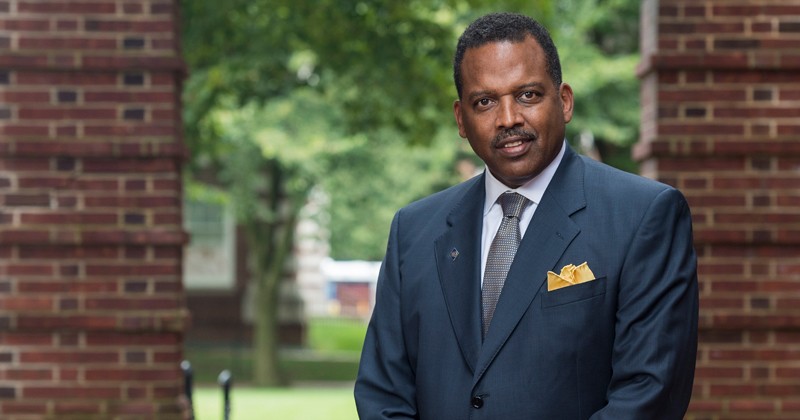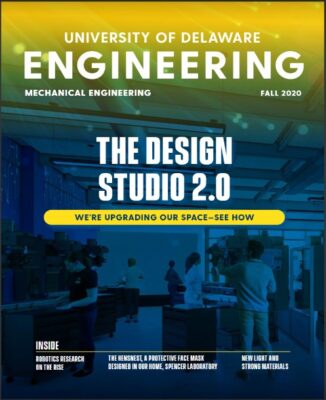Levi T. Thompson shares vision as new dean of College of Engineering
Levi T. Thompson joined the University of Delaware in early October as dean of the College of Engineering. It’s a homecoming for Thompson, who received a bachelor’s degree in chemical engineering from UD in 1981. He then went to the University of Michigan, where he earned two master’s degrees, in chemical engineering and nuclear engineering, and a doctoral degree in chemical engineering. Thompson is an award-winning educator and is internationally recognized for his research to design and synthesize nanoscale materials for catalytic and energy storage applications. Before joining UD, he was the Richard E. Balzhiser Collegiate Professor of Chemical Engineering at the University of Michigan, Professor of Mechanical Engineering and director of both the Hydrogen Energy Technology Laboratory and the Michigan-Louis Stokes Alliance for Minority Participation. Thompson shared thoughts about his plans as dean.
Q: What made you decide to return to UD as dean?
Thompson: When I was told that the College of Engineering was searching for a new dean, I saw a tremendous opportunity to help an institution that I care deeply about enhance its excellence, reputation and impact. I have 30-plus years of experience in teaching, research, and higher education leadership, and I’ve reached a point in my career where I would like to use that background and this opportunity to make a positive impact on the University of Delaware and the College of Engineering. I am humbled and honored to have this opportunity.
Q: What do you see as the biggest strengths of the University?
Thompson: UD has a strong foundation of excellence in teaching, research, entrepreneurship, community engagement and more, and we have had a sustained, positive impact on the State of Delaware and beyond. A new report shows that for every $1 invested by the State of Delaware, the University generates $23 toward the state’s economy. Delaware has a unique position in the middle of the Eastern seaboard, where we have access to diverse communities, industrial giants, and other resources. As the flagship university in Delaware, we have the opportunity to pioneer initiatives that can impact an entire state and have a nationwide impact, too.
Q: What strengths in the College of Engineering are you most excited to build upon?
Thompson: We have fantastic people and very good facilities, and we are at the leading edge of several important national engineering and science initiatives. For example, the National Institute for Innovation in Manufacturing Biopharmaceuticals (NIIMBL) is based here. The newly launched Data Science Institute will lead the nation in research on the extraction and utilization of data. UD leads a node of the Rapid Advancement in Process Intensification Deployment (RAPID) Manufacturing Institute led by the American Institute of Chemical Engineers (AIChE). The Center for Composite Materials is a national leader, and we have important initiatives to develop autonomous vehicles and smart infrastructures. UD engineers are highly integrated into major initiatives across campus. At the same time, we are producing the next generation of leaders. This year, two of our faculty members were nationally recognized for their innovative teaching methods. The new Spectrum Scholars program in partnership with JPMorgan Chase, a college-to-career program for students with autism majoring in computer and information sciences and in electrical and computer engineering, is a great example. You cannot help but be impressed by the important and consequential work that UD engineers are doing. With a few strategic investments, we will strengthen our position as one of the best engineering colleges in the country. We plan to build upon the foundations that are already in place and forge ahead into some new directions.
Q: Can you give an example of one such endeavor?
Thompson: Just one?….There are so many examples that we could talk about. One that I particularly like to talk about is graduate education. We have the opportunity to transform how graduate students are educated, and doing so could distinguish UD in this area. The current model for graduate education, used by most universities around the world, is a century old. We should think about ways to refresh graduate education as we have done for undergraduate education. As just one example, graduate students should be exposed to entrepreneurship. That doesn’t mean that we should force them to start companies, but they should understand the landscape of entrepreneurship because, today, even large companies have activities that are more like those typical of small, entrepreneurial ventures. Students must also learn how to work in diverse groups with people with different backgrounds and expertise. Successful entrepreneurs know how to build, work in and manage interdisciplinary teams as they solve problems.
Q: What opportunities do you see in undergraduate education?
Thompson: There is a lot more experiential learning — undergraduate research, internships, co-ops, service learning — available to today’s undergraduates than there was when I was in school. These experiences help students absorb and build upon the fundamental lessons they learn in the classroom. However, one challenge of experiential learning is that it often comes with a high cost. I want to explore cost-effective ways to deliver even more experiential learning to our students. Virtual reality offers one possible platform. You could walk through a power plant, fly over a major structure or swim inside a chemical reactor and watch molecules react. We could collaborate with other colleges and industry on some of these ideas.
Q: As a high school student, what made you decide to attend UD as an undergraduate?
Thompson: I really enjoyed science and math; I also liked tinkering with things. After talking to my high school chemistry teacher, Carol Anderson, a UD graduate, I decided to pursue chemical engineering. I also wanted to play basketball, and an assistant coach from UD approached me about playing here during a high school all-star game. This was the place. Some doubted that I could be a chemical engineer and a basketball player, but with encouragement from my family, I was confident that I could do both. I took the negative comments as a personal challenge. Who would have guessed that I would return to UD to help lead the College of Engineering? I tell you that we should never tell a young person that they can’t do something.
Q: Who inspired you during your time at UD?
Thompson: I was fortunate to have a number of excellent teachers and mentors. Like most freshmen, I felt a little out of place. I was also underprepared for calculus, so I had a bit of catching up to do. Professor John Burmeister, my freshmen chemistry professor (who recently retired), encouraged me to forge ahead. He was one of my favorite professors. Professors Fraser Russell and Bob Pigford also provided great advice about how to be successful in chemical engineering. I did undergraduate research with Jerry Schultz, measuring densities of polymers. Professor Cos Denson, who passed away earlier this year, inspired me to think big. Professor Stan Sandler — who I still talk with to this day — and Professor Bruce Gates were very influential in helping me select the research area that I would later focus on. Jon Olson was the faculty director of the Minority Engineering Program (MEP), where I was a participant. MEP was the precursor to the Resources to Insure Successful Engineers (RISE) program that exists in the College of Engineering today.
Q: At Michigan, you worked with the National Science Foundation-funded Michigan-Louis Stokes Alliance for Minority Participation, a group that works to increase the number of underrepresented minority students earning bachelor’s degrees in STEM fields. How will you make diversity and inclusion a priority here at UD?
Thompson: For me, excellence and diversity go together. People from different backgrounds bring a diversity of experiences and thoughts that make for much better solutions. Diverse groups can also identify opportunities that individuals might miss. My predecessor as dean, Babatunde Ogunnaike, made substantial progress in enhancing diversity in the college. For example, three of the seven department chairs in our college are women, which is great. It is difficult to think of another engineering college with that proportion of female chairs. The RISE program offers mentorship and more to underrepresented students. However, we must build upon these successes and do even more. I am proud to say that while I was the director of the Michigan-Louis Stokes Alliance for Minority Participation, we launched a Dual Degree in Engineering Program (DDEP) between the University of Michigan and the colleges of the Atlanta University Center Consortium, which includes Clark Atlanta University, Morehouse College and Spelman College. This program allowed students to earn a bachelor’s degree in a science area such as physics or chemistry, or mathematics, and then earn an engineering degree at Michigan. This program provides participating students with tremendous educational opportunities and also helps to build diversity and excellence. We will explore opportunities for a dual degree or partnership program like the DDEP.
UD has also been a member of the Philadelphia-Louis Stokes Alliance for Minority Participation for more that 25 years and has been awarded three NSF Bridge to the Doctorate grants over the past 15 years. We will continue to leverage these valuable resources to support and extend our reach.
Q: You are an expert in energy storage applications and have a long track record of research and innovation. What research opportunities do you see here at UD?
Thompson: Engineers are problem solvers. In thinking about research areas, we often ask the question: What do people need? Engineers at this University are doing research that can help us mitigate the effects of climate change, improve human health, and much more. We will pursue important discoveries and develop innovative technologies that have local and global impact. I will work with my colleagues within the college and beyond to identify and investigate opportunities to do just that.


